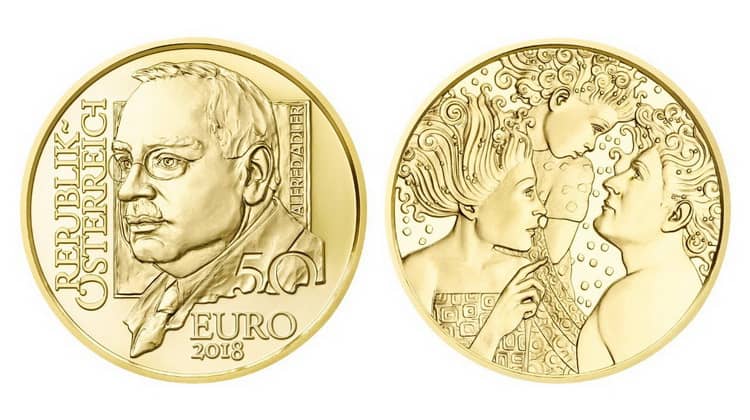
50 Austrian euros are collectible coins mostly of gold. They have been issued since 2002, from the moment when the country superseded shilling in favor of a new currency. One of the most recognizable coins of this denomination is so-called gold “Philharmoniker”, which mostly enriches private collections. However, other 50 Euro coins of the Austria Mint have a place on the lists of the most popular collectible coins in the world.
“Vienna Philharmonic” series
Production: Austrian Mint
Design: Thomas Pesendorfer.
Metal: gold (Au 999)
Weight: 15.552 g
Diameter: 28 mm
Thickness: 1.6 mm
Circulation: 2002/40,922; 2003/26,848; 2004/24,269; 2005/21,049; 2006/20,085; 2007/25,091; 2008/73,800; 2009/92,300; 2010/56,600.
The very first gold Philharmoniker produced by the Austrian Mint with a face value of 50 euro was issued in 2002, replacing the previous 500-shilling coin. Since then, Philharmoniker has been produced annually. Like other coins of the series, 50 euros was designed by the famous Austrian master Thomas Pesendorfer. Philharmoniker is composed from 1/4 ounce of gold with a fineness of 999.9 (exact composition: 99.99% fine gold and 0.1% copper).
Obverse: image of the pipe organ of the Vienna Philharmonic Orchestra; inscription «REPUBLIK ÖSTERREICH» at the top; gold purity index «¼ UNZE 999.9» at the bottom.
Reverse: range of musical instruments that the Vienna Philharmonic Orchestra usually uses: a cello, Viennese horn, four violins, a harp and bassoon; inscription «WIENER PHILHARMONIKER».
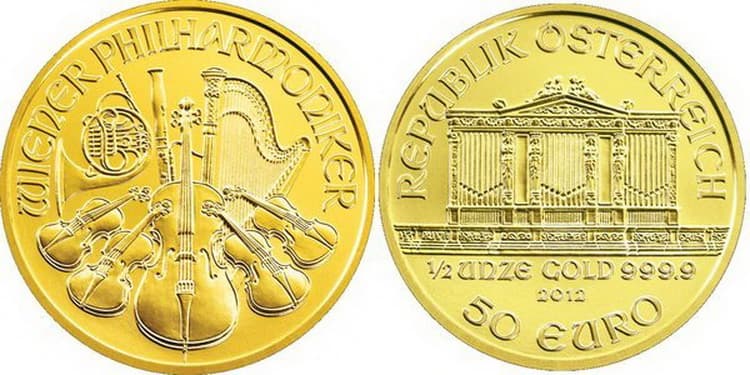
“2,000 years of Christianity” series
General specifications of the series
Production: Austrian Mint
Design: Helmut Andexlinger
Metal: gold (986)
Weight: 10.14 g
Diameter: 22 mm
Edge: plain
Circulation: 50,000 (Proof)
The Catholic Order of St. Benedict
Date of minting: 3.13.2002.
Obverse: Saint Benedict with his sister during the compilation of the rules of the order; the Holy Scholasticism in the image of a dove
Reverse: monk working on his manuscript
2,000 years of Christianity Austrian 50 Euro 2002 gold coins in the GoldAdvert catalogue
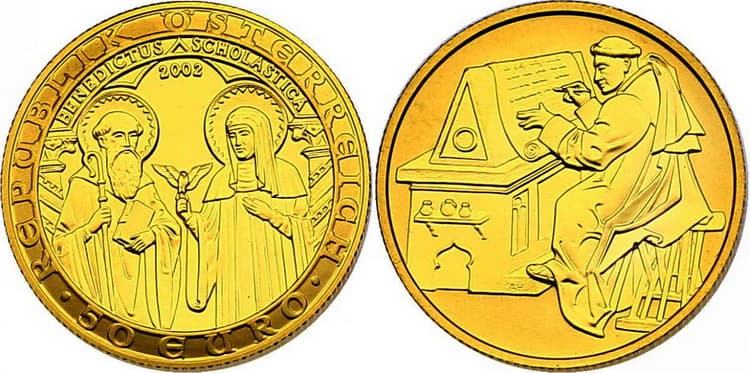
Christian mercy
Date of minting: 3.12.2003.
Obverse: image of a nun caring for sick in fulfillment of the commandments of Jesus Christ.
Reverse: stylized image of one of the parables of the New Testament: the parable about the Good Samaritan.
Christian mercy Austrian 50 Euro 2003 gold coins in the GoldAdvert catalogue
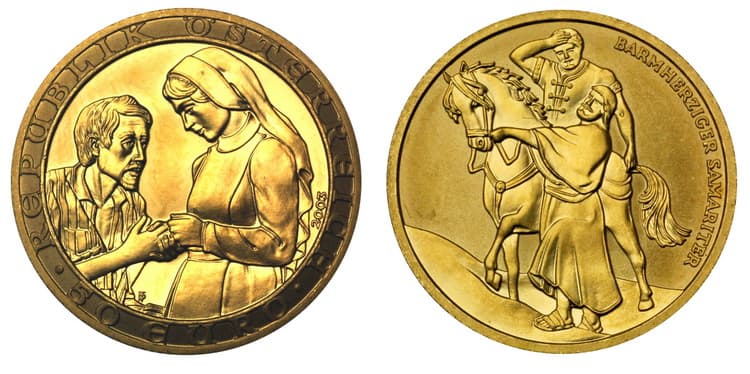
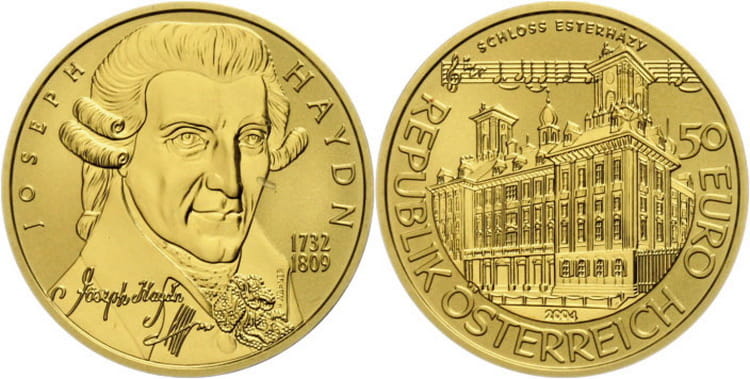
Ludwig van Beethoven
Date of minting: 2.16.2005
Obverse: facade of the Lobkowicz palace; the front page of one of the symphonies of Beethoven.
Reverse: portrait of the composer and his signature.
Ludwig van Beethoven Austrian 50 Euro 2005 gold coins in the GoldAdvert catalogue.
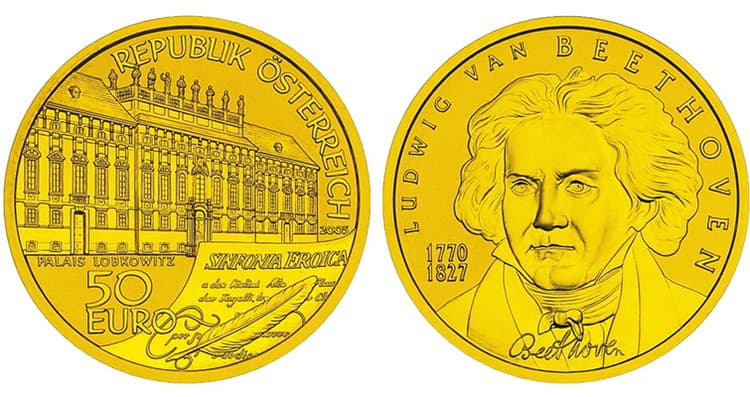
Wolfgang Amadeus Mozart
Date of minting: 2.1.2006
Obverse: Salzburger street of Getreidegasse with the house where Mozart was born.
Reverse: portrait of the composer and his father, Leopold.
Wolfgang Amadeus Mozart Austrian 50 Euro 2006 gold coins in the GoldAdvert catalogue.
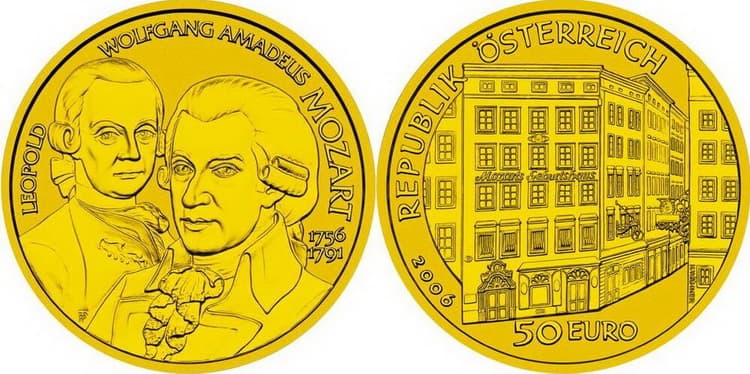
“Famous Doctors of Austria” series
General specifications of the series
Production: Austrian Mint
Design: Helmut Andexlinger
Metal: gold (986)
Weight: 10.14 g
Diameter: 22 mm
Edge: plain
Circulation: 50,000 (Proof)
Gerard van Swieten
Date of minting: 2.31.2007
Obverse: portrait of the founder of the Vienna School of Medicine, based on a number of contemporary portraits; the staff of Aesculapius (a staff entwined by a serpent) as a symbol of this medical series.
Reverse: the compositional project of the Academy of Sciences, the handwritten text of the reform “the plan in the field of medicine” and the branch of the Swietenia Mahogany.
Austrian 50 Euro 2007 gold coins in the GoldAdvert catalogue.
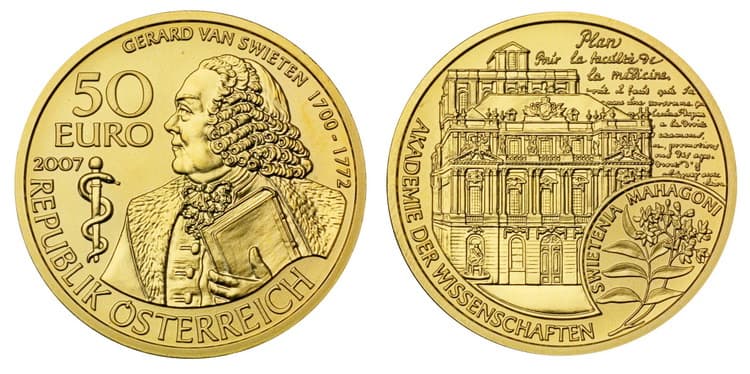
Ignaz Philipp Semmelweis
Date of minting: 1.30.2008
Obverse: portrait of one of the most famous doctors of the country with the Rod of Aesculapius in his hand, which is the logo of the entire series.
Reverse: old general hospital in Vienna, where Semmelweis worked; image of a doctor and a student washing their hands before examining the patient.
Austrian 50 Euro 2008 gold coins in the GoldAdvert catalogue.
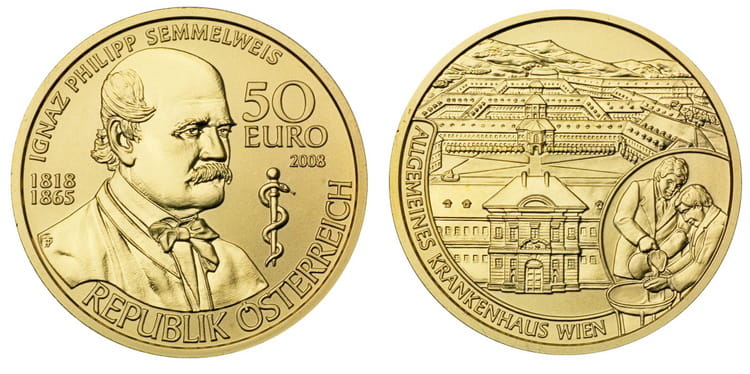
Theodor Billroth
Date of minting: 2.11.2009
Obverse: portrait of Billroth with the medical symbol of Aesculapius.
Reverse: surgeon and his assistants conducting a demonstration surgery; old general hospital in Vienna where Billroth worked and taught.
Austrian 50 Euro 2009 gold coins in the GoldAdvert catalogue.
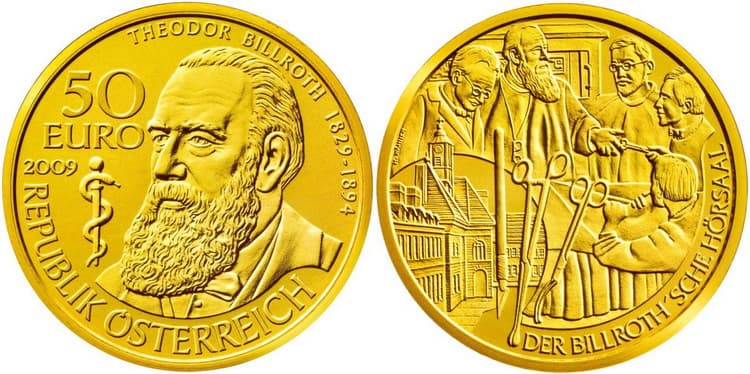
Clemens von Pirquet
Date of minting: 26.05.2010
Obverse: portrait in the Clemens von Pirquet, based on a photography.
Reverse: nurse with a sick child in a hospital; University Children’s Clinic; Dr.Pirquet with his microscope during a medical research; inscription: «Begründer der Allergielehre» (the founder of the allergology).
Austrian 50 Euro 2010 gold coins in the GoldAdvert catalogue.
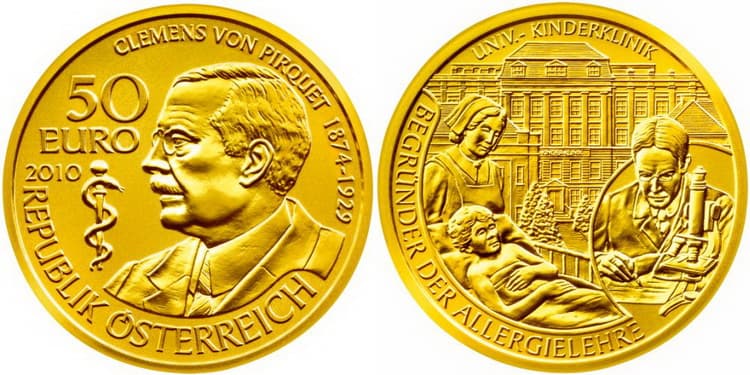
“Gustav Klimt and his women” series
General specifications of the series
Production: Austrian Mint
Design: Thomas Pesendorfer and Herbert Weiner
Metal: gold (986)
Weight: 10.g
Diameter: 22 mm
Edge: plain
Circulation: 30,000 (Proof)
Portrait of Adele Bloch-Bauer
Date of minting: 1.25.2012
Obverse: portrait of the artist.
Reverse: portrait of Adele Bloch-Bauer, which is the first of the artist’s masterpieces in this coin series.
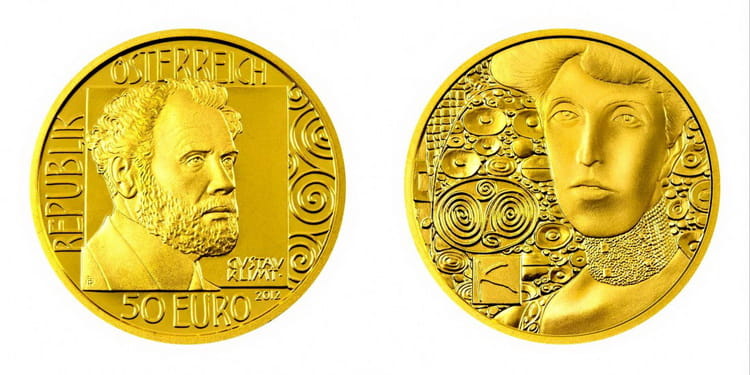
The Expectation
Date of minting: 2.27.2013
Obverse: tree of life; mosaic from the famous Klimt’s frieze on the walls of the Stoclet Palace in Brussels.
Reverse: fragment of a fresco in the Egyptian style called “The Waiting” (Egyptian motifs really inspired the artist.
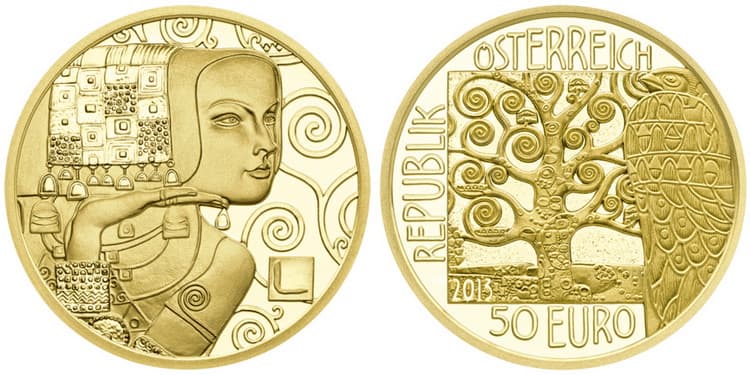
Judith II
Date of minting: 2.19.2014
Obverse: fragment of the picture “Naked truth”, written by Klimt in 1889. The long-haired beauty holding the mirror shows artistic truth without a compromise and is an excellent example of Klimt’s artistic vision
Reverse: fragment of the picture “Judith II”. Queen Judith with her hair loose looks to the right, to where lays the head of Holofernes, the Assyrian general, who threatened to destroy her home town of Bethulia.
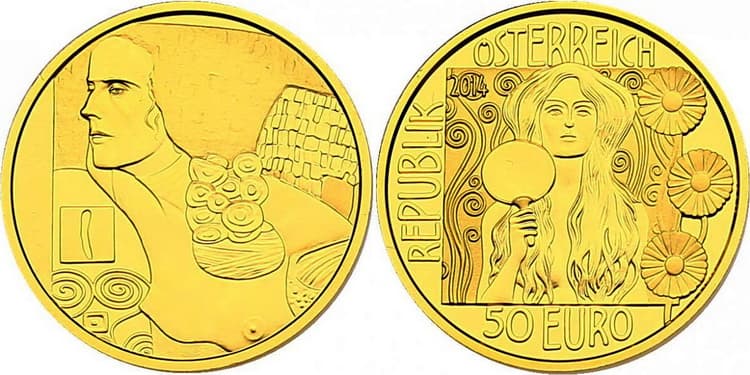
Medicine
Date of minting: 4.15.2015
Obverse: details from the Klimts picture “Jurisprudence”, depicting the Greek deities of vengeance; snakes emphasize the patterns of the hair of the gorgon in the center; the goddess of justice on the right.
Reverse: details from the picture “Medicine” – Hygieia, the daughter of the Greek god of medicine; snake of Aesculapius wound around her arm.
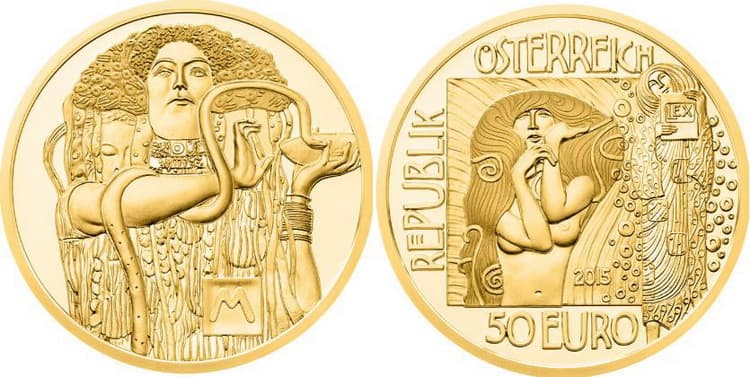
The Kiss
Date of minting: 4.13.2016
Obverse: portrait of Emile Floge in 1902 by Klimt, which experts often consider his best picture of a woman.
Reverse: famous Klimt’s painting “The Kiss”.
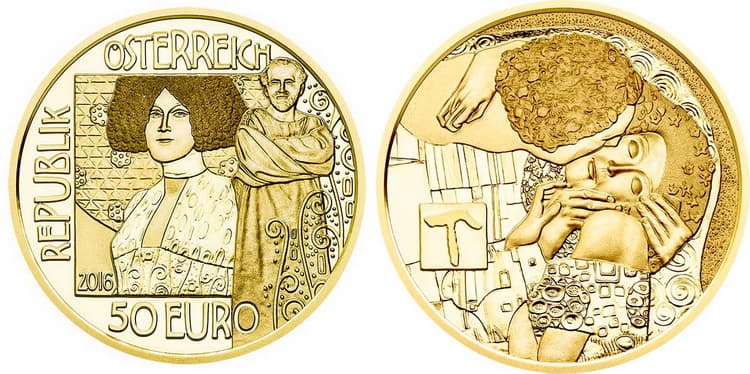
The cost of Austrian 50 euro coins
Today The Austrian Mint sells only two series: «Famous doctors of Austria» and «Klimt and his women». The price of these coin series varies from 398 to 510 euros per unit. It’s worth noting that every coin from these series goes in an exclusive case with a certificate and a stamp of a mint.
The coins from the earlier series enriched different private collections. It’s price depends on the place and country of selling and varies from 550 to 1,380 euros per unit.
Interesting facts
- Relatively fresh series of gold coins with the 50 euro denomination called “The famous doctors of Austria” is becoming more and more popular. The particular attention should be paid to the investment coin, dedicated to Dr. Ignaz Semmelweis. He was called the “savior of mothers”, as he was the first man in the middle of the 19th century to diagnose the cause of maternity fever correctly. By promoting disinfection of hands and instruments he became the savior of thousands women and infants during childbirth.
- The painting that was engraved on the coin “Portrait of Adele Bloch-Bauer” was the most expensive painting in the world in the first decade of the 21st century. It was acquired for Neue Galerie in New York at a price of 135 million dollars in 2006.
Comments
No commens yet.